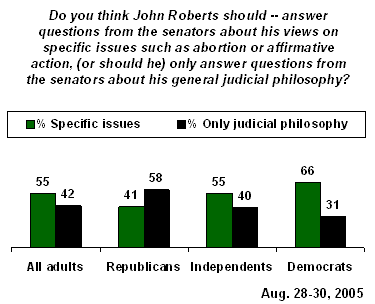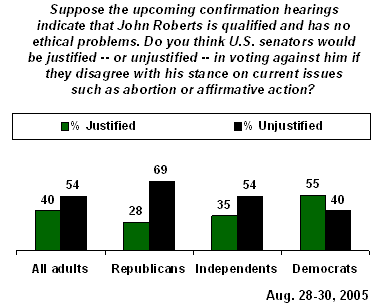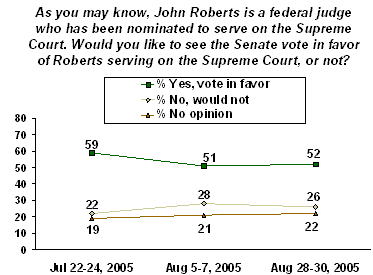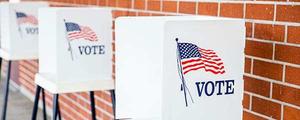GALLUP NEWS SERVICE
PRINCETON, NJ -- Senate confirmation hearings for Supreme Court nominee John Roberts, scheduled to begin Tuesday, have been delayed because of the passing of Chief Justice William Rehnquist. A recent CNN/USA Today/Gallup poll finds that most Americans say they plan to follow the hearings at least somewhat closely, which may take on added meaning given President George W. Bush's decision to nominate Roberts for chief justice. The public is more inclined to believe that Roberts should answer questions regarding his views on specific issues rather than limiting his responses to questions on his general judicial philosophy. When Americans are asked what they most want to learn about Roberts, the most frequent response concerns his views on abortion. Americans currently favor Roberts' confirmation by a 2-to-1 margin, but many still do not have an opinion on the matter.
The impending hearings are the first on a Supreme Court justice since Stephen Breyer was confirmed in 1994. Roughly 6 in 10 Americans say they plan to follow the hearings very (18%) or somewhat (41%) closely, according to the Aug. 28-30 poll (conducted before Rehnquist's death on Saturday). Slightly less than half of Americans say Roberts' confirmation matters to them -- including 20% who say it matters a great deal and 27% who say a moderate amount.
Recent nominees have done their best to avoid answering most questions on controversial issues such as abortion, especially after Robert Bork's answers to such questions contributed to his being denied a seat on the court after he was nominated by Ronald Reagan. Nevertheless, a majority of Americans, 55%, believe that Roberts should answer questions on specific issues, while 42% disagree and say he should answer only questions about his general judicial philosophy. Views on this matter vary by partisanship -- Republicans are more inclined to think Roberts should answer only philosophical questions, while independents and Democrats think he should answer specific issue questions.

The poll asked Americans to name, without prompting, what they are most interested in learning about Roberts during the hearings. Twenty-eight percent mention something about his views on abortion, by far the most common response. Other issues mentioned include minority rights and civil rights, economics, and gay marriage and homosexual rights.
As you may know, senators will be asking John Roberts about his views on a variety of subjects. On what subjects would you most like to hear John Roberts' views during his confirmation hearings? [OPEN-ENDED]
|
2005 Aug 28-30 |
|
|
% |
|
|
Abortion/Roe v. Wade/Women's right to choose |
28 |
|
Minority rights/Civil rights |
6 |
|
Economics |
6 |
|
Gas/Oil prices |
5 |
|
Judicial system reform/Supreme Court issues |
5 |
|
Constitutional views |
4 |
|
Gay marriage/Homosexual rights |
4 |
|
Healthcare |
4 |
|
Religious issues |
3 |
|
War |
3 |
|
Death penalty/Capital punishment |
3 |
|
Morals/Family values |
3 |
|
Crime |
2 |
|
Education reform |
2 |
|
Stem cell research |
2 |
|
Terrorism |
2 |
|
Foreign affairs |
2 |
|
Affirmative action |
2 |
|
His background (qualifications/integrity) |
1 |
|
Immigration |
1 |
|
Gun control |
1 |
|
Privacy laws |
1 |
|
Eminent domain |
1 |
|
|
|
|
Other |
14 |
|
Nothing |
11 |
|
Everything |
1 |
|
No opinion |
19 |
|
Note: Percentages add to more than 100% due to multiple responses. |
|
Democrats (37%) are more likely than independents (22%) or Republicans (26%) to want to learn about Roberts' views on abortion.
Whether senators ultimately vote to confirm Roberts will depend to at least some degree on how he answers their questions. Should they disagree with his positions on specific issues but otherwise think he is qualified to serve, most Americans believe senators should still vote to confirm Roberts. Fifty-four percent say senators would not be justified in voting against Roberts purely because of issue disagreements, while 40% say they would be justified in doing so.
These views show a dramatic partisan divide. By a 69% to 28% margin, Republicans say senators would not be justified in voting against Roberts based only on policy disagreements, while Democrats believe senators would be justified in doing so, by a 55% to 40% margin.

Current Support for Roberts
The poll finds 52% of Americans currently in favor of Roberts' confirmation, while 26% are opposed and another 22% have no opinion. These results are in line with two earlier polls on Roberts, conducted after Bush nominated him to replace retiring Justice Sandra Day O'Connor, though his support was slightly higher immediately after Bush's announcement.

When asked to predict what the ideological slant of Roberts' decisions might be as a justice, 48% of Americans say "about right." Twenty-four percent think he would be "too conservative" and 8% "too liberal." One in five have no opinion.
The same question was asked about two other recent Supreme Court nominees. In June 1993, 47% of Americans said Ruth Bader Ginsburg would be about right, 14% said she would be too liberal, 4% too conservative, and 35% had no opinion. In a July 1991 poll, 46% said Clarence Thomas would be about right, with 20% saying too conservative, 7% too liberal and 27% having no opinion.
Views of Rehnquist
Supreme Court justices -- even the chief justice -- are typically not widely known by the general public (with Clarence Thomas an exception). In the most recent survey asking about Rehnquist -- a May 20-22 CNN/USA Today/Gallup poll -- 38% of Americans did not have an opinion about the chief justice. However, opinion toward Rehnquist was decidedly more positive (46%) than negative (16%). The 46% favorable rating was actually the lowest for Rehnquist in four measurements, as 50% to 53% rated him favorably in polls conducted in 1999, 2000, and 2004.
Opinions of William Rehnquist, Gallup Polls
|
Favorable |
Unfavorable |
Never heard of |
No opinion |
|
|
% |
% |
% |
% |
|
|
2005 May 20-22 |
46 |
16 |
21 |
17 |
|
2004 Nov 19-21 |
53 |
20 |
13 |
14 |
|
2000 Dec 15-17 |
50 |
15 |
19 |
16 |
|
1999 Jan 8-10 |
51 |
8 |
18 |
23 |
Survey Methods
These results are based on telephone interviews with a randomly selected national sample of 1,007 adults, aged 18 and older, conducted Aug. 28-30, 2005. For results based on this sample, one can say with 95% confidence that the maximum error attributable to sampling and other random effects is ±3 percentage points. In addition to sampling error, question wording and practical difficulties in conducting surveys can introduce error or bias into the findings of public opinion polls.
28. As you may know, John Roberts is a federal judge who has been nominated to serve on the Supreme Court. Would you like to see the Senate vote in favor of Roberts serving on the Supreme Court, or not?
|
|
Yes, vote |
No, |
No |
|
% |
% |
% |
|
|
2005 Aug 28-30 |
52 |
26 |
22 |
|
|
|
|
|
|
2005 Aug 5-7 ^ |
51 |
28 |
21 |
|
2005 Jul 22-24 ^ |
59 |
22 |
19 |
|
^ WORDING: As you may know, John Roberts is the person nominated to serve on the Supreme Court. Would you like to see the Senate vote in favor of Roberts serving on the Supreme Court, or not? |
|||
Trends for Comparison:
Ruth Bader Ginsburg
Ruth Bader Ginsburg is a federal judge who has been nominated by President Clinton to serve on the United States Supreme Court. Would you like to see the Senate vote in favor of Ginsburg serving on the Supreme Court, or not?
|
|
Yes, vote |
No, |
No |
|
1993 Jun 18-21 |
53% |
14 |
33 |
Clarence Thomas
Clarence Thomas is the federal judge nominated to serve on the Supreme Court. Would you like to see the Senate vote in favor of Clarence Thomas serving on the Supreme Court, or not?
|
|
Yes, vote |
No, |
No |
|
1991 Jul 11-14 |
52% |
17 |
31 |
Robert Bork
Robert Bork is a federal judge who has been nominated by President Reagan to serve on the U.S. Supreme Court. Would you like to see the Senate vote in favor of Bork serving on the U.S. Supreme Court, or not?
|
|
Yes, vote |
No, |
No |
|
1987 Aug 24-Sep 2 |
31% |
25 |
44 |
|
1987 Sep 1-13 ^ |
38% |
35 |
26 |
|
^ Gallup for Times Mirror. |
|||
29. If the Senate DOES NOT vote in favor of Roberts serving on the Supreme Court, how much would that matter to you -- a great deal, a moderate amount, not much, or not at all?
30. If the Senate votes in favor of Roberts serving on the Supreme Court, how much would that matter to you -- a great deal, a moderate amount, not much, or not at all?
COMBINED RESPONSES (Q.28-30)
|
|
2005 Aug |
|
% |
|
|
Vote in favor, matters great deal/moderate amount if not confirmed |
29 |
|
Vote in favor, doesn't matter much/at all if not confirmed |
23 |
|
|
|
|
Vote against, doesn't matter much/at all if confirmed |
8 |
|
Vote against, matters great deal/moderate amount if confirmed |
18 |
|
|
|
|
No opinion |
22 |
COMBINED RESPONSES (Q.29-30): How much does Roberts confirmation matter to you?
|
|
Great |
Moderate |
Not |
Not |
No |
|
|
|
|
|
|
|
|
2005 Aug 28-30 |
20% |
27 |
20 |
11 |
22 |
31. From what you know about John Roberts, as a Supreme Court Justice, do you think he would be too liberal, too conservative, or just about right?
|
|
Too |
Too |
About |
No |
|
|
|
|
|
|
|
2005 Aug 28-30 |
8% |
24 |
48 |
20 |
Trends for Comparison:
Ruth Bader Ginsburg
From what you know about Ruth Bader Ginsburg, as a Supreme Court Justice do you think she would be too liberal, too conservative, or just about right?
|
|
Too |
Too |
About |
No |
|
1993 Jun 18-21 |
14% |
4 |
47 |
35 |
Clarence Thomas
From what you know about Clarence Thomas, as a Supreme Court Justice do you think he would be too liberal, too conservative, or just about right?
|
|
Too |
Too |
About |
No |
|
1991 Jul 11-14 |
7% |
20 |
46 |
27 |
32. How closely do you plan to follow the Senate confirmation hearings for John Roberts, which are scheduled to begin in September -- very closely, somewhat closely, not too closely, or not at all closely?
|
|
Very |
Somewhat |
Not too |
Not |
No |
|
2005 Aug 28-30 |
18% |
41 |
22 |
18 |
1 |
33. As you may know, senators will be asking John Roberts about his views on a variety of subjects. On what subjects would you most like to hear John Roberts' views during his confirmation hearings? [OPEN-ENDED] [results shown above]
Q.34-35 SPLIT SAMPLED
34. Do you think John Roberts should -- [ROTATED: answer questions from the senators about his views on specific issues such as abortion or affirmative action, (or should he) only answer questions from the senators about his general judicial philosophy]?
BASED ON 507 NATIONAL ADULTS IN FORM A
|
|
Specific |
Only judicial |
No |
|
2005 Aug 28-30 |
55% |
42 |
3 |
35. Suppose the upcoming confirmation hearings indicate that John Roberts is qualified and has no ethical problems. Do you think U.S. senators would be justified -- or unjustified -- in voting against him if they disagree with his stance on current issues such as abortion or affirmative action?
BASED ON 500 NATIONAL ADULTS IN FORM B
|
|
Justified |
Unjustified |
No |
|
2005 Aug 28-30 |
40% |
54 |
6 |
